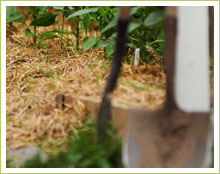Snow & Mulch: The great insulators
Burpee Edible Gardening Team Members

Don't curse the snow blanketing your garden these days. It’s actually one of nature’s best protectors of plants. It insulates them from extremes, and keeps them dormant. This clears the way for healthy spring re-growth.
Don’t have the luxury of winter blizzards in your area? Then you should consider adding a winter mulch to your garden. Applying organic insulators around your plants and on top of your vacant vegetable garden actually help keep the ground frozen (not warm). Winter mulch is a shield from the sun and any unexpected rising temperatures that can play tricks on a plant’s dormancy. Mulching in winter also helps ensure any soil amendments you made during the year don’t wash away too soon.
Mulching your empty vegetable garden with a layer of compost, leaf-mold, grass clippings, wood mulch, straw, or other organic materials provides additional soil nutrition, too. The first step is to cultivate the soil surface, so it’s not too compacted underneath. Then, spread the layer of mulch. The natural freeze/thaw cycle will break down the mulch, and further strengthen your garden for the new spring planting season.
Come warmer weather, rake and remove the winter mulch, and your soil will be on the path to producing healthy vegetable plants.